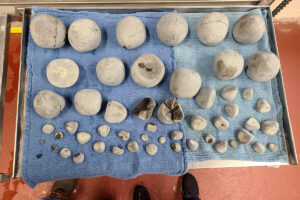International Movement of High-Performance Horses Discussed
- Topics: Article, Horse Industry News
Declared a priority for the Fédération Equestre Internationale (FEI) by its president HRH Princess Haya, and already the focus of a joint conference between the World Animal Health Organization (OIE) and the FEI last October in Guadalajara, Mexico, the international movement of horses was once again a major topic of discussion at the first annual FEI Sports Forum held April 30 to May 2 in Lausanne, Switzerland.
As equestrian sport expands internationally, the official rules and regulations for importing high-performance sport horses into various countries should be improved and harmonized worldwide, said FEI Veterinary Director Graeme Cooke, MA, VetMB, MRCVS, speaking from FEI headquarters in Lausanne. Having globally standardized testing and quarantine requirements for this particular group of horses–"which by necessity must have high health standards"–would facilitate their international movement, he added.
"This is particularly true for emerging equestrian communities, where greater understanding and modernization of the health certification and quarantine requirements for horses competing at international levels is needed," Cooke added. "Many of the regulations currently in place in these communities are outdated or not based on actual risk, requiring people to often prove their horses are free of diseases that have never existed in their home country." The result is excessive testing and often overcautious and disproportionate quarantine periods, which can lead to stress, lack of exercise, and even health problems.
While quarantine is "necessary to prevent the spread of disease," it should be managed in a consistent way for high-performance sport horses worldwide, Cooke said. Currently, quarantine takes place in either private stables or quarantine centers, often at sites that do not allow access for the horse’s grooms and riders. "This can be unfair as the horse and rider prepare for competition," he said. "The lack of training is clearly negative for an equine athlete at this level
Create a free account with TheHorse.com to view this content.
TheHorse.com is home to thousands of free articles about horse health care. In order to access some of our exclusive free content, you must be signed into TheHorse.com.
Start your free account today!
Already have an account?
and continue reading.

Related Articles
Stay on top of the most recent Horse Health news with

















